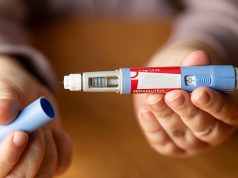Plus, authors say AI-powered programs may expand reach, convenience versus human-led diabetes prevention programs
By Lori Solomon HealthDay Reporter
THURSDAY, Nov. 13, 2025 (HealthDay News) — An artificial intelligence (AI)-powered lifestyle intervention app for prediabetes reduces the risk for diabetes similarly to traditional, human-led programs in adults, according to a study published online Oct. 27 in the Journal of the American Medical Association.
Nestoras Mathioudakis, M.D., from Johns Hopkins University School of Medicine in Baltimore, and colleagues compared referral to a lifestyle intervention exclusively driven by AI to referral to a human coach-led diabetes prevention program (DPP) lifestyle intervention. The analysis included 368 adults with prediabetes and overweight or obesity randomly assigned to an AI-powered DPP lifestyle intervention delivered via a mobile app and Bluetooth-enabled digital scale or referral to a human coach-led DPP lifestyle intervention delivered remotely.
The researchers found that after referral, 93.4 percent of patients initiated the AI-led DPP versus 82.7 percent initiating the human-led DPP. The primary outcome (a composite of maintaining a hemoglobin (Hb) A1c <6.5 percent throughout the study and achieving at least 5 percent weight loss, at least 4 percent weight loss plus at least 150 minutes of weekly physical activity, or an absolute reduction in HbA1c of at least 0.2 percentage points at 12 months) was achieved by 31.7 percent in the AI-led DPP group and 31.9 percent in the human-led DPP group (risk difference, −0.2 percent), meeting the criterion for noninferiority. For individual components of the composite outcome, findings were consistent.
“Unlike human-coached programs, AI-DPPs can be fully automated and always available, extending their reach and making them resistant to factors that may limit access to human DPPs, like staffing shortages,” co-first author Benjamin Lalani, also from Johns Hopkins, said in a statement. “So, while the black-box nature of AI is a commonly cited barrier to clinical adoption, our study shows that the AI-DPP can provide reliable personalized interventions.”
Copyright © 2025 HealthDay. All rights reserved.








